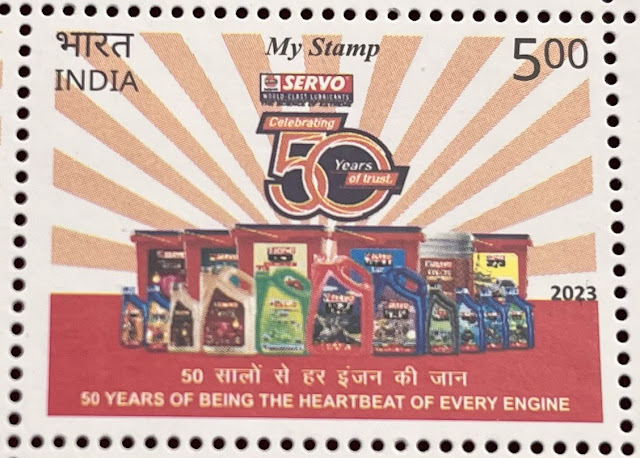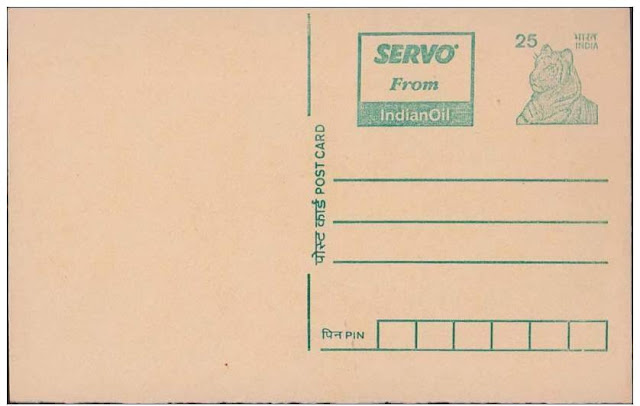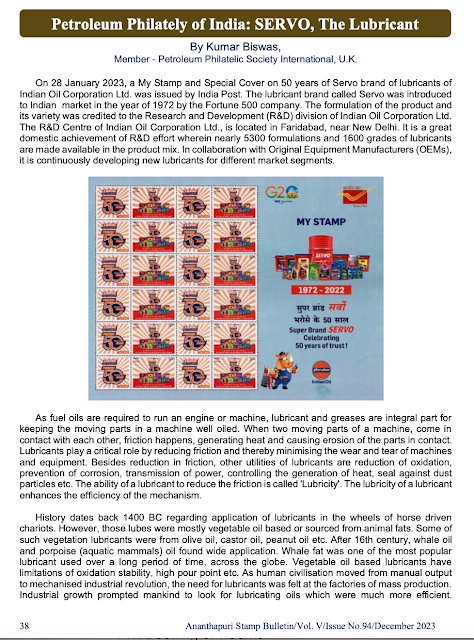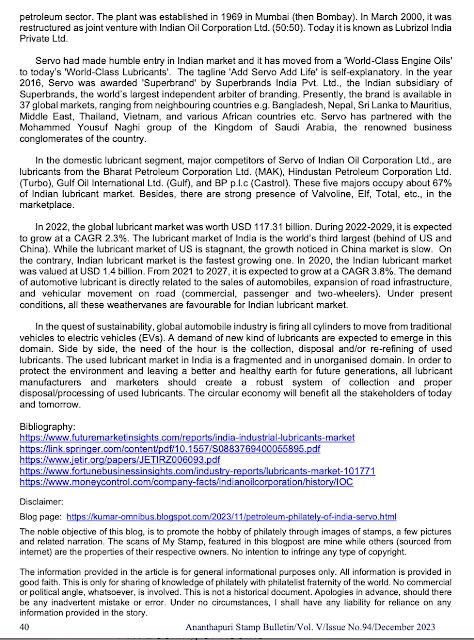 |
| Servo - My Stamp |
On 28 January 2023, a My Stamp and Special Cover on 50 years of Servo brand of lubricants of Indian Oil Corporation Ltd. was issued by India Post. The lubricant brand called Servo was introduced to Indian market in the year of 1972 by the Fortune 500 company. The formulation of the product and its variety is credited to the Research and Development (R&D) division of Indian Oil Corporation Ltd. The R&D Centre of Indian Oil Corporation Ltd., is located in Faridabad, near New Delhi. It is a great domestic achievement of R&D effort wherein nearly 5300 formulations and 1600 grades of lubricants are made available in the product mix. In collaboration with Original Equipment Manufacturers (OEMs), it is continuously developing new lubricants for different market segments.
 |
| Golden Jubilee of Servo |
As fuel oils are required to run an engine or machine, lubricant and greases are integral part for keeping the moving parts in a machine well oiled. When two moving parts of a machine, come in contact with each other, friction happens, generating heat and causing erosion of the parts in contact. Lubricants play a critical role by reducing friction and thereby minimising the wear and tear of machines and equipment. Besides reduction in friction, other utilities of lubricants are reduction of oxidation, prevention of corrosion, transmission of power, controlling the generation of heat, seal against dust particles etc. The ability of a lubricant to reduce the friction is called 'Lubricity'. The lubricity of a lubricant enhances the efficiency of the mechanism.
 |
| Servo - My Stamp |
History dates back 1400 BC regarding application of lubricants in the wheels of horse driven chariots. However, those lubes were mostly vegetable oil based or sourced from animal fats. Some of such vegetation lubricants were from olive oil, castor oil, peanut oil etc. After 16th century, whale oil and porpoise (aquatic mammals) oil found wide application. Whale fat was one of the most popular lubricant used over a long period of time, across the globe. Vegetable oil based lubricants have limitations of oxidation stability, high pour point etc. As human civilisation moved from manual output to mechanised industrial revolution, the need for lubricants was felt at the factories of mass production. Industrial growth prompted mankind to look for lubricating oils which were much more efficient. Lubricants of petroleum oil origin found their application in the early 1900s. In today’s world, majority of lubricants are based on petroleum oil.
 |
| Servo - My Stamp and Selvedge |
As the application of machinery increased by leaps and bounds, it was experienced that petroleum oil based products were not effective enough for the desired task of lubrication. Researchers burnt midnight candles and additives entered in the field of lubricants. Thus, today's lubricants are brilliant and judicious combination of one or more base oils and selective additives to have particular characteristics and performances. In other words, additives are compounds which are blended in a particular ratio with base oils to enhance the performances of the lubricants.
 |
| Servo - Full Sheet of My Stamp |
Lubricants or 'lubes' are generic terms describing engine oils, gear oils, greases, hydraulic fluids, transmission oils etc. While motor oil enhances fuel efficiency of automotives, gear oil lubricates parts of gear components. Lubricants have application in all types of industry viz. automobile, cement, textile, steel, petrochemical, mining, marine, etc. Based on its utilities, it is broadly classified as automotive and industrial grade lubricants. Automotive lubricants improve vehicular performance and enhances engine longevity. Industrial lubricants are used in heavy duty application of various industries.
 |
| Source: Internet |
Major players in international lubricant market are Sinopec Corporation of China, Royal Dutch Shell plc of The Netherland, ExxonMobil Corporation and Chevron Corporation of US, BP Plc of U.K., Total S.A. of France, Petronas of Malaysia etc.
The history of petroleum based lubricant production in India dates back 1960s.
In the year 1962, an agreement was signed between newly formed (1960) Indian Oil Corporation Ltd., and Mobil Petroleum Co. Ltd., New York for setting up two lubricant blending plants, one each at Kolkata (then Calcutta) and Mumbai (then Bombay). On 25 March 1963, a new joint venture company with 50:50 share between Indian Oil Corporation Ltd., and Mobil Petroleum Co. Ltd., was formed and it was named as Indian Oil Blending Ltd., which set up lube plants.
 |
| Source: Internet |
Lubricants of the joint venture was initially marketed through Mobil network. On 19 July 1974, the said agreement was terminated. The 4000 equity shares of Indian Oil Blending Ltd., that was held by Mobil, was transferred to Indian Oil. Thus, Indian Oil Blending Ltd., became a fully owned subsidiary of Indian Oil. After the expiry of the agreement, effective July'1974, Indian Oil Corporation Ltd., started directly marketing Servo brand lubricants.
 |
| Source: Internet |
In the year 1966, another lubricant company named Lubrizol India Limited was formed with 60% of the subscribed equity held by Government of India and balance 40% shareholding by Lubrizol Corporation U.S.A. It was based on continuous Technology Transfer Agreement for transfer of R&D knowledge, manufacturing and formulation technologies etc. The company was involved in development, manufacture and supply of chemical additives and speciality chemicals, chiefly for petroleum sector. The plant was established in 1969 in Mumbai (then Bombay). In March 2000, it was restructured as joint venture with Indian Oil Corporation Ltd. (50:50). Today it is known as Lubrizol India Private Ltd.
 |
| Servo - The Super Brand |
Servo had made humble entry in Indian market and it has moved from a 'World-Class Engine Oils' to today’s 'World-Class Lubricants'. The tagline 'Add Servo Add Life' is self-explanatory.
 |
| SERVO ADDS LIFE |
In the year 2016, Servo was awarded 'Superbrand' by Superbrands India Pvt. Ltd., the Indian subsidiary of Superbrands, the world’s largest independent arbiter of branding. Presently, the brand is available in 37 global markets, ranging from neighbouring countries e.g. Bangladesh, Nepal, Sri Lanka to Mauritius, Middle East, Thailand, Vietnam, and various African countries etc. Servo has partnered with the Mohammed Yousuf Naghi group of the Kingdom of Saudi Arabia, the renowned business conglomerates of the country.
 |
| Source: Internet |
 |
| Lubricant from Bharat Petroleum |
 |
| Source: Internet |
In 2022, the global lubricant market was worth USD 117.31 billion. During 2022-2029, it is expected to grow at a CAGR 2.3%. The lubricant market of India is the world’s third largest (behind of US and China). While the lubricant market of US is stagnant, the growth noticed in China market is slow. On the contrary, Indian lubricant market is the fastest growing one. In 2020, the Indian lubricant market was valued at USD 1.4 billion. From 2021 to 2027, it is expected to grow at a CAGR 3.8%. The demand of automotive lubricant is directly related to the sales of automobiles, expansion of road infrastructure, and vehicular movement on road (commercial, passenger and two-wheelers). Under present conditions, all these weathervanes are favourable for Indian lubricant market.
In the quest of sustainability, global automobile industry is firing all cylinders to move from traditional vehicles to electric vehicles (EVs). A demand of new kind of lubricants are expected to emerge in this domain. Side by side, the need of the hour is the collection, disposal and/or re-refining of used lubricants. The used lubricant market in India is a fragmented and in unorganised domain. In order to protect the environment and leaving a better and healthy earth for future generations, all lubricant manufacturers and marketers should create a robust system of collection and proper disposal/processing of used lubricants. The circular economy will benefit all the stakeholders of today and tomorrow.
Bibliography:
https://www.futuremarketinsights.com/reports/india-industrial-lubricants-market
https://link.springer.com/content/pdf/10.1557/S0883769400055895.pdf
https://www.jetir.org/papers/JETIRZ006093.pdf
https://www.fortunebusinessinsights.com/industry-reports/lubricants-market-101771
https://www.moneycontrol.com/company-facts/indianoilcorporation/history/IOC
Disclaimer:
The noble objective of this blog, is to promote the hobby of philately through images of stamps, a few pictures and related narration. The scans of My Stamp, featured in this blogpost are mine while others (sourced from internet) are properties of their respective owners. No intention to infringe any type of copyright.
The information provided in the article is for general informational purposes only. All information is provided in good faith. This is only for sharing of knowledge of philately with philatelist fraternity of the world. No commercial or political angle, whatsoever, is involved. This is not a historical document. Apologies in advance, should there be any inadvertent mistake or error. Under no circumstances, I shall have any liability for reliance on any information provided in the story.
*************
 |
| Page 1 of 3 |
 |
| Page 2 of 3 |
 |
| Page 3 of 3 |







No comments:
Post a Comment